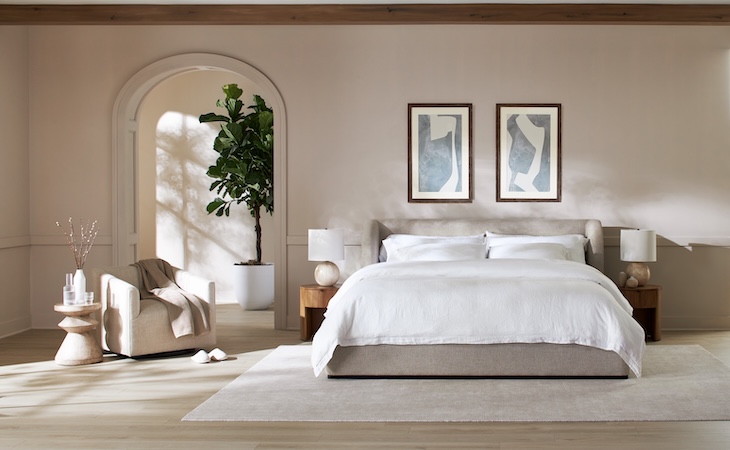Are you sleeping as well as you could be? Aside from keeping a regular bedtime and generally adhering to a routine that includes good sleep hygiene, decluttering your bedroom and moving toward a more minimalist lifestyle could make a difference.
Transitioning to a more mindful way of living and perhaps even adopting a zero-waste lifestyle is hard to do overnight. However, following the steps below can help you change the way you approach material belongings and even help you get a better night’s sleep. Here’s how to get started.
The concept of minimalism and zero-waste living
Before we take a closer look at how to declutter your bedroom, let’s clarify the concepts of living minimally and moving toward zero-waste living.
Throughout our adult lives, and possibly even before, most of us accumulate countless material possessions. Some of those may have been necessary temporarily, some were just bought on a whim, and others are the items that turn into heirlooms. Minimalist living means understanding what you really need and letting go of the rest—removing the clutter.
Don’t think of this transition as instant. For most of us, decluttering and transforming our lives into zero-waste existences requires time and a solid strategy. Start by defining the goals of your minimalism and zero-waste journey.
Perhaps you’re looking to create space to give your bedroom a calmer, more relaxed atmosphere. Perhaps you’re noticing that you’re surrounded by items that no longer “spark joy,” as minimalism guru Marie Kondo put it. No matter what your motivations are for decluttering, make sure you approach the process with a plan.
At first sight, it may seem like minimalism and a zero-waste lifestyle contradict each other. After all, transitioning to minimalist living means getting rid of some of your possessions. But that doesn’t mean throwing them away.
Once you’ve decided what needs to go and what’s staying, look for ways that give your unwanted items a new lease of life. Charities near you may accept donations. You may also be able to sell or donate furniture and other goods to second-hand stores.
The most important thing is to understand what you’re removing and why.
Steps to decluttering your bedroom: sorting and categorizing
Once you’ve defined your goals, it’s time to start making them a reality. Like moving house, decluttering can be a little overwhelming at first. It’s only natural to wonder where to start. Before physically tackling wardrobes or drawers, decide on categories for your items.
There’s no need to overthink your categories. For most people, dividing their possessions into those they want to keep, those they want to remove, and an in-between category works well. Allocate boxes, suitcases, or wardrobe space for all three categories. How can you choose what goes where? A simple rule is to consider when you last used an item. If it’s been more than a year, you probably no longer need that particular piece.
Especially if your bedroom is a relatively large space, consider moving one wardrobe at a time. If that feels like it’s too much still, break your decluttering down into individual drawers or wardrobe sections. Set aside time in your day when you’ll only focus on decluttering. Limiting your efforts to an hour or two at a time breaks the task down into more manageable chunks too.
Benefits of a decluttered bedroom and minimalist lifestyle
Decluttering your bedroom and choosing a minimalist lifestyle benefits you on a personal level, but it can also help society as a whole and the environment.
Think of it this way: An item you no longer want may be perfectly usable for years in another family’s home. By passing on your item, you won’t only improve the look and feel of your home, but you’re also conserving precious resources, be it raw materials themselves or the energy needed to produce a specific item from those materials.
Other benefits of decluttering and choosing minimalist living include:
- More money in your pocket. As soon as you stop impulse-buying and start selling unwanted items, you’ll notice that you have cash to spare.
- More contentedness and mindfulness. Removing possessions from your life not only creates physical space but also helps improve mental clarity. A bedroom packed full of furniture, clothes, and other things can soon feel oppressive. Making space creates room to breathe and think.
- More joy in your life. In the sense of Marie Kondo, practical items that we like using instill a sense of joy into our daily life.
- More time on your hands. Forget weekly trips to the mall or hours spent online shopping. Moving toward minimalist living soon lets you see that you have everything you need. Why buy more?
Evaluating the look and feel of your bedroom after decluttering
Decluttering lets you see your bedroom in a new light. With unwanted items gone, take the opportunity to reorganize clothes, for example. Storing clothes by season is a great way of maximizing wardrobe space, and it only takes a few minutes to bring out thick sweaters when the days get colder or find your favorite summer dress when the sun comes out.
Having said that, storing clothes isn’t the main function of your bedroom. Take a look at your bed, bedside furniture, and any other pieces of furniture in the room. How do you feel about them? Are they contributing to a calm atmosphere that will help you get a good night’s sleep?
You may think that the look and feel of your bedroom don’t matter too much for restful sleep. After all, your eyes are closed when you’re sleeping. However, a well-organized, decluttered bedroom will likely encourage you to adopt a better sleep routine as well as contribute to your lifestyle transition.
The bottom line
Choosing a minimalist, zero-waste lifestyle may feel like a big transition to tackle. Start by setting realistic achievable goals such as decluttering one room at a time. Your bedroom is an excellent place to start removing unwanted and unnecessary items that may be useful to others. You benefit by gaining space and enjoying a better night’s sleep.




